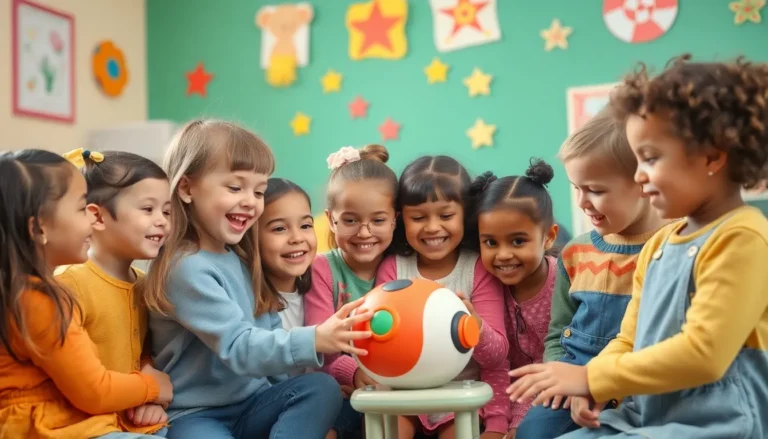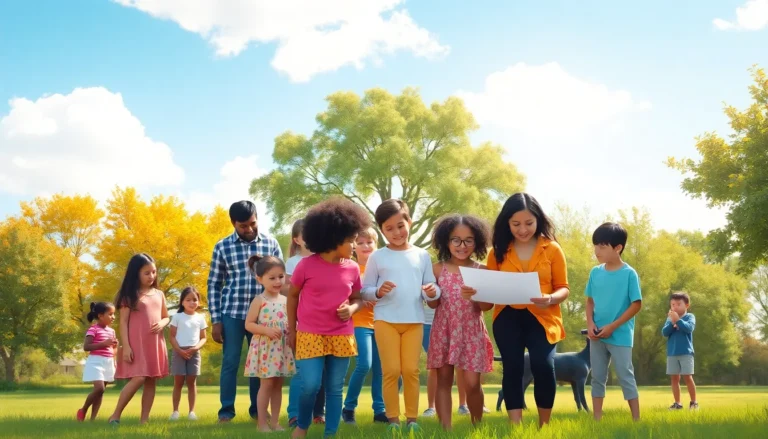Table of Contents
ToggleIn a world where kids think broccoli is a type of dinosaur, teaching them about nutrition can feel like a Herculean task. Yet, kids nutrition classes are here to save the day! These engaging sessions not only transform picky eaters into veggie enthusiasts but also equip children with the knowledge they need to make healthier choices.
Overview of Kids Nutrition Classes
Kids nutrition classes offer engaging ways to teach children about healthy eating habits. Focusing on interactive learning, these classes encourage kids to explore nutritious foods while dispelling common myths about them.
Importance of Nutrition for Kids
Nutrition significantly impacts children’s growth and development. A balanced diet supports physical health, cognitive function, and emotional well-being. Healthy eating habits developed during childhood often persist into adulthood, influencing long-term health. Engaging in nutrition education allows children to understand food choices better. It fosters their skills for making informed decisions about what they consume daily.
Types of Kids Nutrition Classes
Various kids nutrition classes focus on different aspects of healthy eating. Interactive cooking classes teach children how to prepare healthy meals using fresh ingredients. Gardening workshops help kids understand where food comes from, promoting an appreciation for fruits and vegetables. Nutritional workshops emphasize the benefits of a balanced diet, addressing food groups and portion sizes. Some programs offer online courses, making nutrition education accessible from home. Each class aims to instill lifelong healthy habits through fun and practical experiences.
Benefits of Kids Nutrition Classes

Kids nutrition classes offer significant advantages for young learners. These classes create an environment where children develop better eating habits.
Improved Eating Habits
Children who participate in nutrition classes often show increased willingness to try new foods. Engaging educational techniques encourage kids to explore a variety of fruits and vegetables. Studies indicate that children exposed to diverse foods in a fun setting tend to make healthier choices at home. Over time, preferences shift towards nutritious options, leading to balanced diets. Classes also highlight the importance of portion control and meal planning, equipping children with skills for independence. Understanding the connection between food and energy levels fosters motivation for healthy eating.
Enhanced Awareness of Food Choices
Nutrition classes elevate children’s awareness regarding food choices. With hands-on activities, they learn to identify nutritious foods versus processed options. Discussions about the benefits of vitamins and minerals clarify the role of diet in overall well-being. Kids gain insight into reading nutrition labels, which helps them make informed decisions in grocery stores. Exploring food origins and sustainability increases their appreciation for healthy eating. Increased knowledge contributes to lifelong habits, as children carry these lessons into adulthood. By instilling these values early, classes set the foundation for healthier generations.
Structure of Typical Kids Nutrition Classes
Typical kids nutrition classes consist of a well-defined structure designed to engage young learners. They incorporate various elements, from structured lessons to hands-on activities, ensuring children grasp essential nutritional concepts.
Curriculum Highlights
Curriculum highlights cover a range of topics centered on healthy eating. Children learn about food groups, benefits of vitamins and minerals, and making balanced meals. Lessons often include interactive discussions that dispel common myths about food. Understanding portion control also plays a key role, as kids discover appropriate serving sizes. Classes often feature visual aids like charts or models to make concepts tangible. By the end of the program, students can confidently make informed food choices.
Activities and Engagement Strategies
Activities and engagement strategies are vital within kids nutrition classes. Interactive cooking sessions allow children to prepare simple, healthy meals. Gardening workshops provide hands-on experience with growing fruits and vegetables, promoting excitement around fresh produce. Group games and challenges foster collaboration, making learning fun. Classes might include tasting sessions to encourage trying new foods, reinforcing positive associations with healthy choices. Multimedia presentations or stories often complement lessons, enhancing understanding and retention. Engaging young learners through diverse activities ultimately promotes better nutrition awareness.
How to Choose the Right Kids Nutrition Class
Selecting the appropriate kids nutrition class involves careful consideration. Parents should look for programs that align with children’s interests and learning styles.
Considerations for Parents
Parents must assess the individual needs of their children. Different age groups might require varying approaches to nutrition education. Many classes emphasize hands-on cooking or gardening activities, which can help kids connect with food. Observing class sizes plays a vital role; smaller groups often allow for personalized attention. Schedule flexibility is also crucial, as it accommodates busy family routines.
Evaluating Class Credentials
Class credentials serve as indicators of quality. Parents should verify the qualifications of instructors who lead these courses. Experience in nutrition or child development enhances course credibility. Accrediting organizations provide additional validation; check for affiliations with recognized health or educational bodies. Reviews and testimonials from previous participants often reflect the effectiveness of the class structure. Lastly, inquire about curriculum details to ensure the content covers essential nutritional concepts effectively.
Kids nutrition classes play a crucial role in shaping healthier eating habits from a young age. By engaging children through fun and interactive methods, these classes help dispel myths and encourage a positive relationship with food.
As children learn about nutrition in a hands-on environment, they become more open to trying new foods and making informed choices. This early education lays the groundwork for lifelong healthy habits that can significantly impact their overall well-being.
Parents can feel confident that investing in these classes not only benefits their children today but also sets them up for a healthier future.








